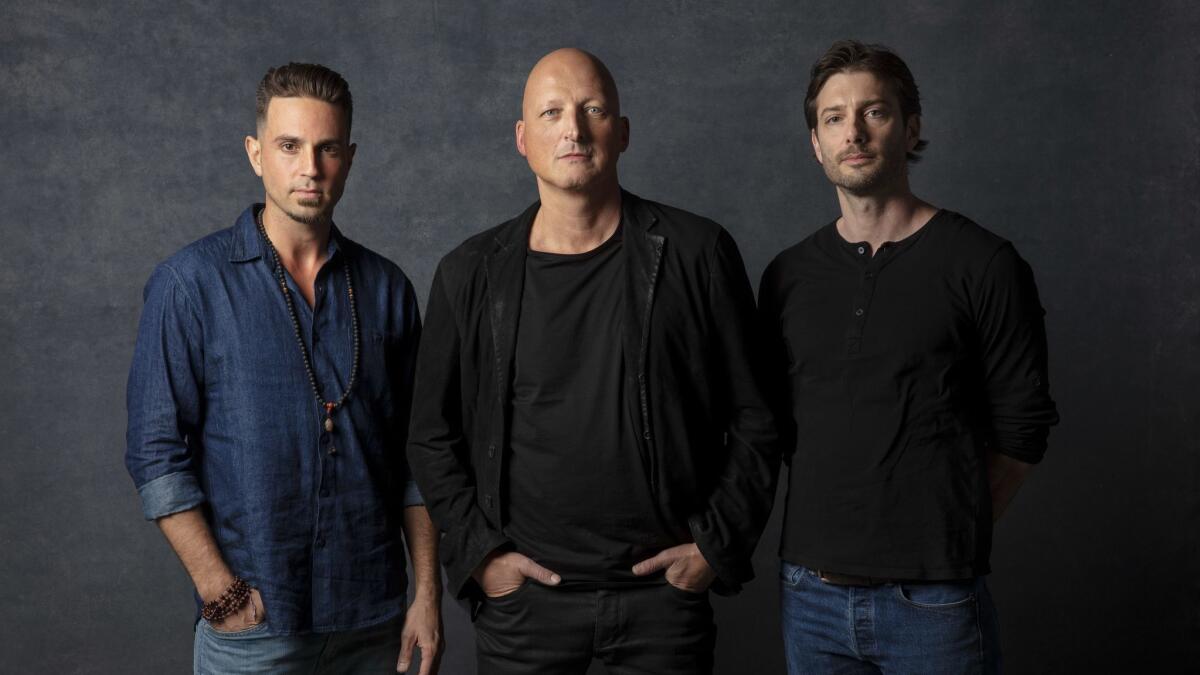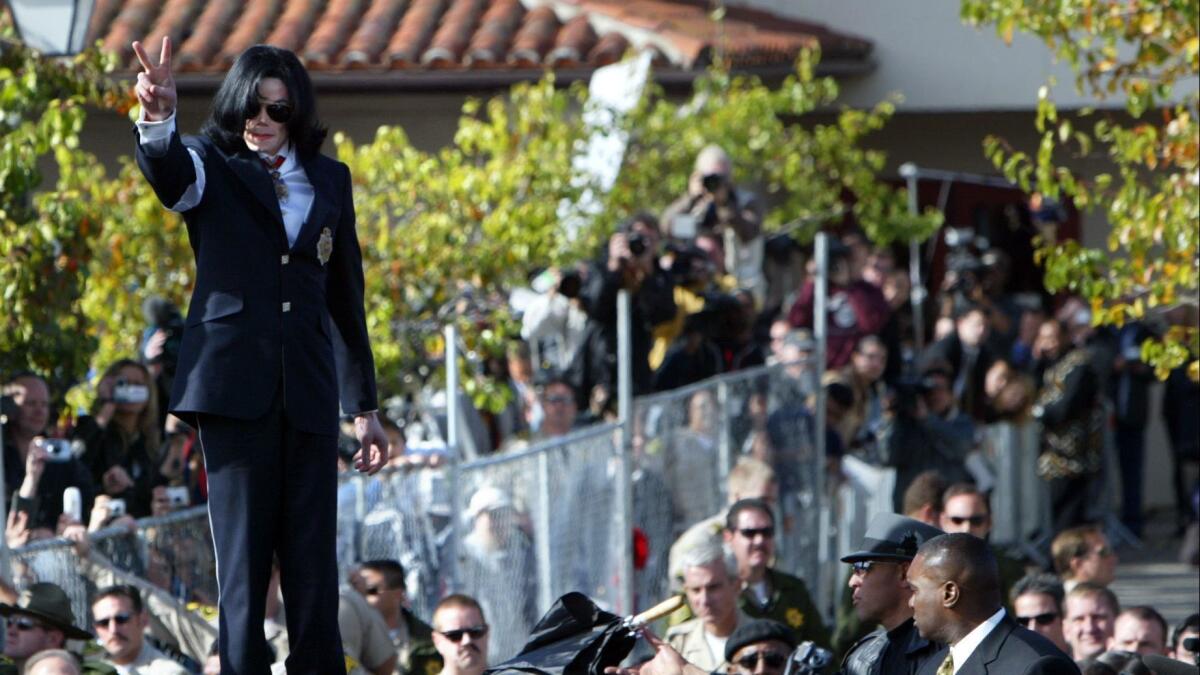Commentary: Watching ‘Leaving Neverland’ after a lifetime of loving Michael Jackson
Reporting from Park City, Utah — Roughly an hour into “Leaving Neverland,” it felt like my chest had caved in.
It was the first full day of the Sundance Film Festival and Park City’s Egyptian Theatre was packed for the premiere of the controversial documentary about two men who claim Michael Jackson abused them sexually as children. We’d heard these stories before, but I tensed up about an hour into the film when James Safechuck, one of Jackson’s accusers, began to describe how the singer introduced him to the concept of masturbation when he was 10.
The details were graphic, delivered with agonizing precision. As the words rolled out of his mouth, I felt the air in my lungs evaporate. I shifted and cringed in my seat, a dizzying rush of sadness, rage and confusion swirling around in my head.
The gut punches continued relentlessly during the nearly four-hour film, and it wasn’t long before I accepted that “Leaving Neverland” would force me — and likely many others who also feel a deep connection to Jackson’s work — to see that none of us really knew him. And that maybe we’d been avoiding the truth.

Michael Jackson’s fans fight back against Sundance documentary ‘Leaving Neverland’ »
Another truth: I’ve spent a lifetime loving MJ.
I had been infatuated with him — and the entire Jackson family, for that matter — for as long as I can remember, but in 1992, when I was 5, Michael Jackson released the spectacular, star-studded video for “Remember the Time” and I couldn’t catch my breath fast enough.
It was the first time I studied Jackson. I mastered every glide, foot spin, vocal tic and growl. I would perform on command for family members. There’s even photo evidence of me, mid-performance. I really thought he was the coolest man in the world.
Michael Jackson was the reason why, at age 9, I begged my parents to make a detour on a family trip and take me to Gary, Ind., so I could see where the Jackson family story began. I wanted to stand in front of the family’s tiny house, the place where Jackson had sung and honed his talents.
Gary didn’t feel much different from the neighborhood where I grew up, some 250 miles away in Cincinnati. Seeing where Michael and his sister Janet (another driving force of my Jackson fandom) started out and following the trajectory of his career gave me and many other young black boys hope that we too could dream without limits. Even as he transformed physically, he was still ours.
On the fourth day of my first dream gig — reporting for the Los Angeles Times – my hero went into cardiac arrest, induced by propofol and benzodiazepine. Michael Jackson was dead, and I was sent to the Hollywood Walk of Fame to interview grieving fans. I told my editors that I was “barely” a fan, afraid of losing my shot to write about him. But his death was like a train barreling into me, and I wept in front of the Times building before drying my eyes and doing my assignment.
In the decade since, I’ve written about Jackson’s music, his estate, his brand and his kids.
I’ve listened to his unreleased songs at Marvin’s Room, the famed studio where he recorded so many of his indelible records. My spine tingled as his voice bounced off those walls. I’ve stood inside the halls of Hayvenhurst, the Jackson compound in Encino, quietly taking in the rooms where he’d once found solace. I’ve been a champion when posthumous projects have shown promise and a critic when they have not.
And I’ve grappled with my own thoughts about the heinous crimes he had been accused of. I’ve spent far more time than I can recall reading court documents, studying the allegations that trailed him, and although I wanted to believe Jackson and those who defended him in court, it became harder to sit with that certainty as time went on.
Sure, he had eccentricities beyond our comprehension, and an ever-shifting face that made him a punchline in life and death. But that alone wasn’t proof he was the child sexual predator some claimed he was. When he would say he was incapable of harming anyone, let alone a child, we were inclined to believe him, even though the image of a grown man sharing his bed with a rotating group of boys, and the shocking numbers that illustrate the general prevalence of child sexual abuse, should have challenged that assumption.
For me, those assumptions were challenged in 2013 when Wade Robson first came forward and claimed that Jackson did, in fact, sexually abuse him as a child. It was a stunning about-face from a man who had staunchly defended Jackson for years, testifying twice — once in 1993 when he was 11 and again in 2005 when he was an adult — that his former mentor had never abused him. Robson and Safechuck explain in the film that they were afraid of admitting the alleged abuse, that they wanted to protect Jackson and that they struggled to come to terms with their experiences.

But my love for Jackson felt distinct somehow, rooted in his messages of love, peace and healing that appealed to me as a kid and that became the soundtrack in my life. The music was gloriously inspirational, transcendent even. (And still is — I haven’t figured out yet what I’m going to do about that.) You might not have liked him, but there’s probably a song of his that’s never left your rotation. And the way this man moved onstage? It was nothing short of spellbinding. There was no one before him and there’s been no one after.
But I left that Sundance theater knowing that my love for the great entertainer Michael Jackson now could never be untangled from the narrative of the man that few of us actually knew.
To be clear, “Leaving Neverland” isn’t a Michael Jackson documentary. To call it one would be to miss the point. It’s a film about two men bound together by experiences they describe as devastating and the things they did to protect a man many saw as a god. It is about the lasting impact of trauma and the cost it can exact on victims and their families.
The film also challenges anyone who revered Jackson to consider what it was that we all saw happening — in Jackson’s history and behavior, and in the accusations against him. Did we ask enough questions? Were we too quick to dismiss the accusers who were often in middle school, if not younger? For those who came forward with their stories, it must have been terrifying to go up against a giant like Jackson. The film begs us to consider why we didn’t give them more credence.
We saw Jackson, and his pain, as he assured us that he could never hurt a child. But did we ever truly see these young boys?
More to Read
The biggest entertainment stories
Get our big stories about Hollywood, film, television, music, arts, culture and more right in your inbox as soon as they publish.
You may occasionally receive promotional content from the Los Angeles Times.











